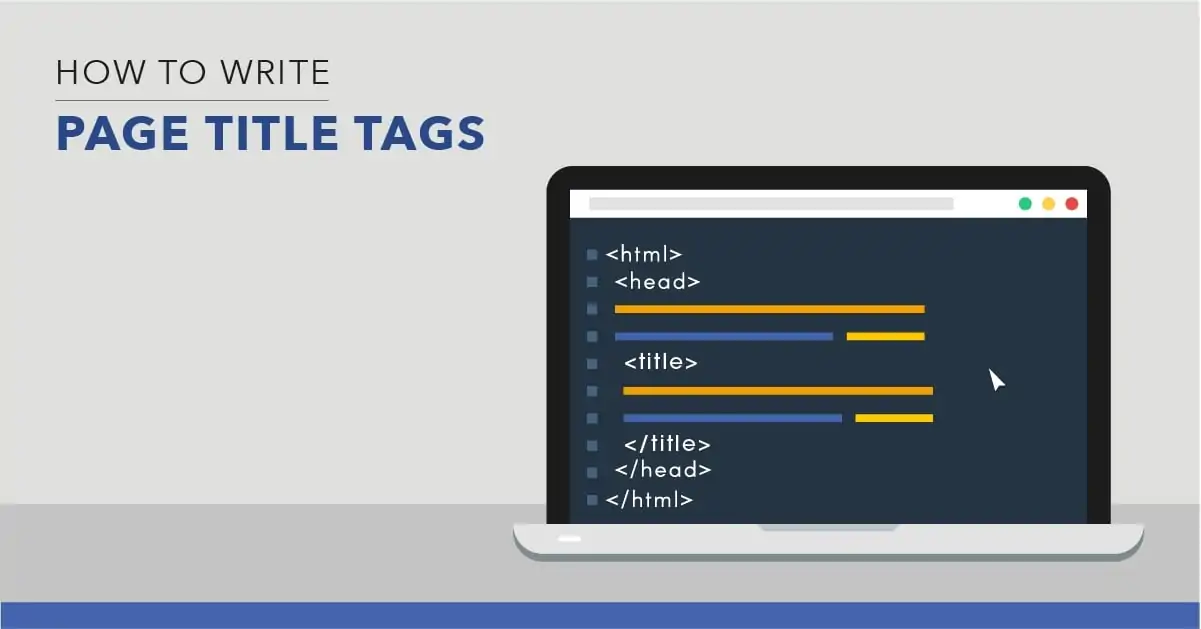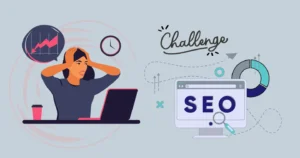Page titles are a fundamental component of Search engine optimization (SEO) that play a pivotal role in determining how well your website ranks in search engine results pages (SERPs).
A well-crafted page title can dramatically enhance your site’s visibility by making it more attractive to both search engines and users.
Crafting effective page titles requires a delicate balance of keyword optimization, user intent, and creativity.
By strategically incorporating relevant keywords, addressing user queries, and employing clear, engaging language, page titles can serve as a powerful tool to draw in traffic.
This guide will delve deep into the intricacies of writing perfect page titles, offering actionable insights to help you optimize this critical SEO element.
Table of Contents
What Is a Page Title in SEO?

A page title, also known as the title tag, is an essential HTML element that defines the title of a web page. This title is visible in three primary locations:
- Search Engine Results Pages (SERPs): The clickable headline of a search result, often serving as the first impression for users deciding whether to click on your link.
. - Browser Tabs: The text displayed on the browser tab when a page is open, helping users navigate between multiple tabs efficiently.
. - Social Media Previews: The title that appears when a page link is shared on social platforms, often influencing the likelihood of clicks and shares.
.
In SEO, page titles are among the most critical on-page elements, functioning as a direct signal to search engines about the content of a page.
They also play a pivotal role in user engagement by providing a concise and compelling description of the page’s purpose.
A well-crafted page title not only helps search engines index your content more accurately but also enhances the user experience by clearly aligning with search intent.
This dual functionality underscores their importance in driving both visibility and traffic to your website.
Why Are Page Titles Important for SEO?

Page titles are crucial for several reasons, acting as a bridge between your content and its audience.
Firstly, Search Engine Ranking depends heavily on the context and relevance provided by page titles.
Search engines like Google analyze these titles to determine the subject of a page, making them an essential ranking factor that can elevate your website’s visibility in search results.
Secondly, page titles significantly influence Click-Through Rate (CTR).
A well-crafted title acts as a magnet, attracting users by addressing their search intent directly and compelling them to click.
The result is increased traffic, which can lead to better engagement and conversions.
Thirdly, User Experience is enhanced through clear and informative page titles. Users often skim search results to find the content that best matches their needs.
Titles that accurately reflect the content reduce bounce rates and build trust, ensuring that visitors find what they are looking for.
Lastly, Brand Recognition is bolstered through consistent and strategic optimization of page titles.
Over time, well-optimized titles can establish your brand’s authority and relevance in your niche, making your content more recognizable and trusted.
These factors collectively highlight the immense value of thoughtfully crafted page titles in driving SEO success and user engagement.
Page Title SEO Examples
Here are some examples of effective SEO page titles across various niches:
- E-commerce:
- “Top 10 Wireless Earbuds for 2025 | Best Sound Quality Guaranteed”
. - “Affordable Smart Home Devices | Top Deals & Discounts”
.
- “Top 10 Wireless Earbuds for 2025 | Best Sound Quality Guaranteed”
- Travel:
- “Explore Paris in 3 Days | Ultimate Travel Itinerary”
. - “Top 5 Beach Destinations for Summer 2025”
.
- “Explore Paris in 3 Days | Ultimate Travel Itinerary”
- Technology:
- “How to Set Up Your Smart Home in 2025 | A Complete Guide”
. - “Top Gadgets of 2025: Innovations You Can’t Miss”
.
- “How to Set Up Your Smart Home in 2025 | A Complete Guide”
- Health and Fitness:
- “10 Easy Workouts for Beginners | Get Fit at Home”
. - “Healthy Recipes for Busy Professionals | Quick & Delicious”
.
- “10 Easy Workouts for Beginners | Get Fit at Home”
These examples illustrate the strategic use of keywords, specificity, and user-focused language to create effective titles.
Notice how each title is designed to resonate with its target audience, addressing specific needs or interests while incorporating primary keywords.
For instance, in the e-commerce examples, terms like “affordable” and “top deals” emphasize value, appealing directly to budget-conscious shoppers.
Similarly, the travel titles use phrases like “ultimate itinerary” and “top destinations” to convey expertise and exclusivity, enticing users to click and explore further.
In the technology niche, titles that highlight innovation and ease of use cater to tech-savvy audiences, while health and fitness examples focus on accessibility and practicality, ensuring the content feels approachable.
These diverse examples demonstrate the versatility of optimized page titles across industries, emphasizing the importance of tailoring your approach to your specific audience and goals.
How to Create SEO Page Titles That Stand Out
1. Include Relevant Keywords

Keywords are the foundation of SEO and serve as the building blocks for optimizing page titles effectively.
By incorporating primary and secondary keywords naturally within the title, you make it easier for search engines to understand the content while also attracting users.
For example:
- Keyword: “Smart Home Devices”
. - Title: “Top Smart Home Devices for 2025 | Transform Your Living Space”
.
When integrating keywords, it’s crucial to maintain a balance.
Overloading the title with keywords can come across as spammy and harm the user experience.
Instead, focus on placing the most important keyword towards the beginning of the title for maximum impact, as search engines tend to give more weight to the initial words.
Additionally, think about how the title will resonate with users—a natural, engaging phrasing can enhance click-through rates significantly.
By aligning your keyword strategy with user intent, you can create titles that are both search engine-friendly and appealing to your audience.
2. Write for the User

While keywords are essential, always prioritize user intent when crafting page titles.
A title that aligns with what users are searching for will drive more clicks and engagement.
Effective titles address the needs and interests of the audience, making them feel understood and catered to.
For instance, a user searching for budget-friendly gadgets would be more drawn to a title emphasizing affordability and variety.
Furthermore, an effective page title balances informativeness with intrigue, encouraging users to explore further.
For example:
- Poor: “Buy Gadgets Online”
. - Better: “Top Gadgets for Every Budget | Shop the Best Deals Now”
.
By clearly stating the benefits and including a call to action, the improved title appeals directly to the user’s needs while remaining informative and engaging.
This user-centric approach can lead to higher click-through rates and better on-page engagement, both of which contribute positively to SEO performance.
3. Try Long Sentences, but Pay Attention to Length
Search engines typically display the first 50–60 characters of a title.
While longer titles can include more details, it’s crucial to ensure the most critical information appears early to avoid truncation in search results.
Placing primary keywords and essential details within this character limit can maximize visibility and impact.
However, longer titles can still be effective if crafted thoughtfully. For instance:
- Lengthy but effective: “Discover the Best Smart Home Gadgets of 2025 | Affordable & Innovative”
This example works because it combines keywords with user appeal while staying relevant to the content.
Striking a balance between length, clarity, and keyword optimization ensures both search engines and users can easily understand the content’s value.
Keeping mobile displays in mind is also essential, as shorter screen widths may truncate titles earlier.
4. Don’t Be Repetitive or Stuff Keywords
Keyword stuffing harms user experience and can lead to search engine penalties by making content feel unnatural and manipulative.
Search engines prioritize content that provides genuine value to users, so excessive keyword repetition can backfire. Avoid:
- “Buy Smart Home Devices | Smart Home Devices Sale | Cheap Smart Home Devices”
.
Instead, focus on crafting titles that incorporate keywords more naturally while still being engaging and informative. For example:
- “Affordable Smart Home Devices | Best Deals of 2025”
.
This approach ensures the title remains clear, relevant, and attractive to users without sacrificing keyword optimization.
By focusing on user experience and search intent, you can create titles that appeal to both search engines and potential customers, enhancing your overall SEO performance.
5. Don’t Put Your Company Name at the Front
Unless your brand is highly recognized, placing it at the end is generally more effective.
This strategy ensures that the focus remains on the content’s topic and primary keywords, which can better capture user interest and align with search intent.
Users scanning search results are often drawn to the subject matter first rather than the brand name. For instance:
- Poor: “TechGurus | Best Gadgets of 2025”
. - Better: “Best Gadgets of 2025 | TechGurus”
.
By positioning the brand name at the end, you maintain clarity while still reinforcing brand presence.
However, for well-established brands with significant recognition, leading with the brand name can work, especially if the name itself carries authority and trust.
6. Be Specific

Specific titles are more engaging and attract the right audience by clearly conveying what the content offers.
When a title is specific, it helps users immediately understand the benefits of clicking on the link, leading to better engagement and lower bounce rates.
Being precise also improves search engine relevance, as more detailed titles often align better with long-tail search queries. For example:
- Vague: “Fitness Tips”
. - Specific: “10 Easy Fitness Tips for Busy Professionals | Stay Active Anywhere”
.
The specific example works better because it highlights the number of tips, the target audience, and the benefit, making it more compelling.
Incorporating details like numbers, audience focus, and unique benefits can significantly enhance both SEO performance and user interest.
7. Get Some Help
Leverage tools like:
- Google Keyword Planner: To find high-ranking keywords.
. - CoSchedule Headline Analyzer: To evaluate headline effectiveness.
. - SEMrush or Ahrefs: To analyze competitors’ page titles.
.
Common Mistakes to Avoid in Page Title Optimization
- Overloading with Keywords: Overloading page titles with excessive keywords can make them appear spammy and reduce their effectiveness.
Not only does this diminish user trust, but it can also result in search engine penalties that lower your rankings.
Instead, use keywords naturally and sparingly, focusing on readability and relevance.
. - Ignoring User Intent: Writing titles without considering user intent can lead to poor performance in search results.
If the title doesn’t align with what the searcher is looking for, it results in lower click-through rates (CTR) and higher bounce rates.
Ensure your titles directly address search queries and provide a clear indication of the content’s value.
. - Using Generic Titles: Titles that are too vague or broad, like “Fitness Tips” or “Marketing Advice,” fail to capture user interest or rank effectively.
Specific titles that include details such as the audience, benefits, or numbers (e.g., “10 Fitness Tips for Beginners to Stay Active”) tend to perform better by providing clarity and specificity.
. - Exceeding Character Limits: Search engines typically display the first 50-60 characters of a title.
Titles longer than this can be truncated in SERPs, cutting off important information.
To avoid this, prioritize placing key information and keywords early in the title while keeping it concise and impactful.
. - Neglecting Mobile Users: With a growing number of users searching on mobile devices, it’s essential to ensure your titles display properly on smaller screens.
Mobile search results often show fewer characters than desktop, so front-load your titles with the most critical information to ensure visibility across all platforms.
.
Advanced Tips for Perfect Page Titles
- Use Emotional Triggers: Words like “best,” “top,” “ultimate,” and “easy” create intrigue and can significantly boost click-through rates by appealing to emotions.
Emotional triggers create curiosity and a sense of urgency, making your title stand out in crowded search results.
For example, instead of “Learn SEO Tips,” using “Master the Ultimate SEO Techniques for Rapid Growth” evokes stronger emotional interest.
. - A/B Test Titles: Experiment with different versions to see what resonates most with your audience.
A/B testing involves creating multiple versions of a title and analyzing their performance based on key metrics like CTR and engagement.
This process helps identify what language, structure, and emotional triggers are most effective for your target audience.
. - Localize When Relevant: Include location-specific keywords for local SEO to attract users searching for services or products in a particular area.
For instance, “Best Coffee Shops in Brooklyn | Cozy Cafés Near You” is more effective for a location-based search than a generic title.
Localizing your titles can enhance visibility in regional searches and improve relevance for geographically specific queries.
.
Final remarks
Writing the perfect page title with SEO in mind is both an art and a science.
It requires a comprehensive understanding of how keywords influence rankings, how user behavior impacts click-through rates, and how creative phrasing can capture attention.
Effective page titles bridge the gap between search engines and human readers, balancing technical optimization with engaging language.
By incorporating relevant keywords, aligning with user intent, and crafting compelling, concise messaging, you can create page titles that both rank well and draw in qualified traffic.
Mastering SEO takes consistent effort, experimentation, and the use of powerful tools.
However, with practice and a data-driven approach, you can refine your page titles to maximize their impact, driving both visibility and engagement for long-term success.






